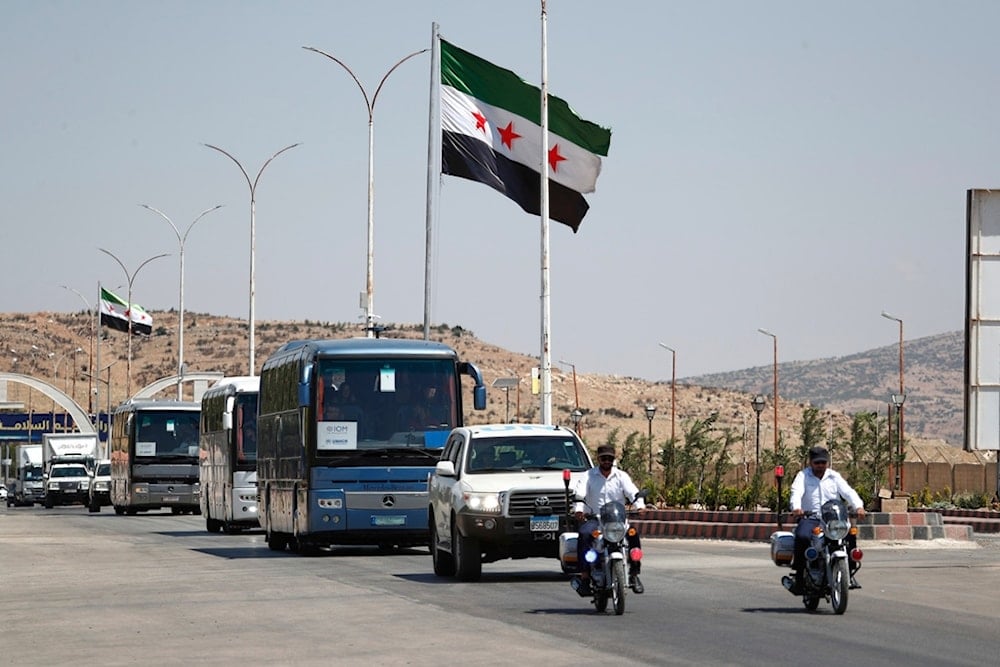Syria rocked by protests over Sweida crackdown, Israeli interference
Mass protests erupt across Syria, condemning Israeli interference and the atrocities committed in Sweida, demanding an international probe, aid access, and the release of the missing.
-

A convoy of buses carrying Syrian refugees who return home from Lebanon, arrives at the Syrian border crossing point in Jdeidet Yabous, Syria, Tuesday, July 29, 2025 (AP)
Demonstrations swept across several areas of Syria, including Daraa and the Damascus countryside, on Thursday in rejection of what protesters described as “Israeli interference” in Syria’s internal affairs, while affirming the unity and sovereignty of the country.
Protesters chanted slogans underscoring Syrian national identity and rejecting all forms of foreign military or political intervention. The demonstrations reflected rising public anger over both external meddling and domestic repression.
In southern Syria, massive protests erupted in the key cities of Sweida, Salkhad, Shahba, Slin, Qanawat, Mufala, and Abu Zureiq. Protesters condemned what they described as “unprecedented atrocities” committed by the transitional authority’s forces during recent events in Sweida province.
Demands for government forces withdrawal
Demonstrators carried banners demanding the immediate withdrawal of government forces from dozens of villages still subjected to looting and destruction, with many homes reportedly burned to the ground. Protesters also called for the opening of humanitarian corridors and an end to the ongoing security and military siege on Sweida.
Criticism was also directed at Damascus’ recent announcement of a local investigation into the events. Protesters rejected the committee’s legitimacy, insisting that “the aggressor cannot investigate its own crimes,” and demanded an international inquiry instead.
The rallies also called for the disclosure of the fate of hundreds of missing residents from Sweida and condemned the incitement and disinformation spread by the Syrian state and affiliated media outlets. Protesters urged Damascus to allow foreign journalists to enter Sweida, after security forces reportedly barred press access in recent days.
Syria meeting with 'Israel'
A ministerial meeting between Syria and the Israeli occupation is scheduled to take place on Thursday in Baku to address security concerns in southern Syria, a diplomat told AFP.
Syrian Foreign Minister Asaad al-Shaibani is set to meet with Israeli Minister of Strategic Affairs Ron Dermer, following a similar round of talks held in Paris last week. According to the diplomat, who spoke on condition of anonymity due to the sensitivity of the matter, the Baku meeting will take place after Shaibani makes an unprecedented visit to Moscow earlier that day.
The Baku meeting will focus on "the security situation, particularly in southern Syria," the diplomat said.
Discussions in Paris centered on "recent security developments and attempts to contain the escalation in southern Syria," according to Syrian state television.
That meeting followed a deadly outbreak of violence in Syria’s Druze-majority Sweida province, where clashes claimed the lives of more than 1,400 people, according to the Syrian Observatory for Human Rights.
"Israel," claiming to protect the Druze, struck the Syrian presidential palace and the army headquarters in Damascus.
Paris meeting
In an unprecedented political development, Syrian Foreign Minister Asaad Hassan al-Shaibani met with senior Israeli officials in Paris on Thursday, with mediation led by the US envoy to Syria, Tom Barrack, according to The Monitor's Ben Caspit on Friday.
According to the diplomat, al-Shaibani will travel to Moscow on Thursday for talks with Russian officials, where discussions will focus on a range of issues, including the future of Russian military bases in Syria. The negotiations aim to clarify the terms governing the continued operation of Russia’s naval facility in Tartus and its airbase in Hmeimim.
In January, Russia’s Deputy Foreign Minister Mikhail Bogdanov met with Syria’s interim President Ahmed al-Sharaa in Damascus.

 4 Min Read
4 Min Read








